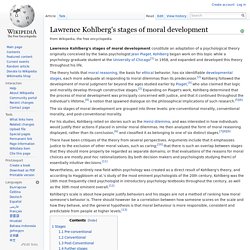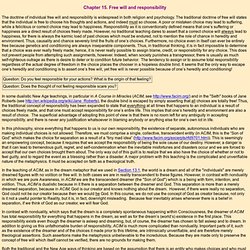

Overview of Moral Development. Kohlberg's Moral Development. Lawrence Kohlberg's stages of moral development constitute an adaptation of a psychological theory originally conceived by the Swiss psychologist Jean Piaget.

Kohlberg began work on this topic while a psychology graduate student at the University of Chicago[1] in 1958, and expanded and developed this theory throughout his life. The six stages of moral development are grouped into three levels: pre-conventional morality, conventional morality, and post-conventional morality. For his studies, Kohlberg relied on stories such as the Heinz dilemma, and was interested in how individuals would justify their actions if placed in similar moral dilemmas.
He then analyzed the form of moral reasoning displayed, rather than its conclusion,[6] and classified it as belonging to one of six distinct stages.[7][8][9] There have been critiques of the theory from several perspectives. Free Will. In some dualistic New Age teachings, in particular in A Course in Miracles (ACIM, see and in the "Seth" books of Jane Roberts (see the double bind is escaped by simply asserting that all choices are totally free!

Thus, the traditional concept of responsibility has been expanded to state that everything at all times that happens to an individual is a result of choices freely made, and that one must accept responsibility for one’s entire life. This implies that one’s heredity and environment are also a result of choice.